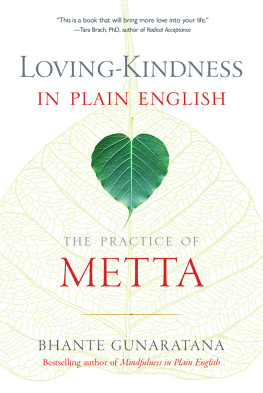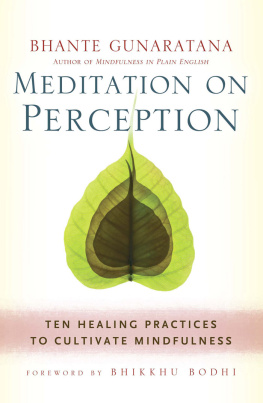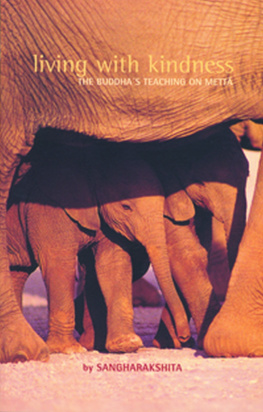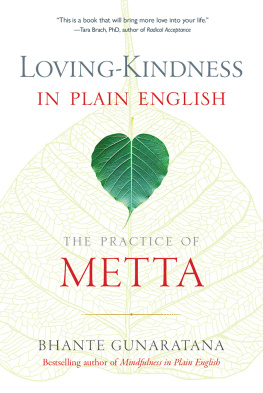W hether you are new to Buddhism or not, you will find wisdom in Bhante Gunaratanas straightforward guidance, delivered with his signature warmth and gentleness, to the ancient concept of metta (known as loving-kindness or loving-friendliness). Through anecdotes, meditations, and conversational renderings of the Buddhas words, you will learn that peace is possiblewithin yourself and in your relationships.
A straightforward and simple introduction to loving-kindness, easy to understand and instructive for living a good life. It is a joy to read!
SHAILA CATHERINE, author of Focused and Fearless
Clear and thoughtful. Bhante Gunaratana delights the reader who is interested in better understanding the traditional texts, and also offers beautiful stories from his own life that illustrate the power and benefits of metta practice. Theres something here for everyone.
SHARON SALZBERG, author of Lovingkindness
Preface
E ven though there are several books on metta, or loving-friendliness, this Plain English book is based primarily on the famous Discourse on Loving-Friendliness. Known as the Karaniya Metta Sutta in Pali, or just Metta Sutta for short, this discourse is recited more often than any other discourse, on all occasions in Theravada Buddhist countries. As we so often recite this discourse, we thought writing a book elucidating the meaning of this profound sutta would benefit those who are not quite familiar with the Pali language in which we recite this discourse most of the time.
I am very grateful to Judy Larson and Gyula Nagy for their kind assistance in preparing this book. Also I am grateful to Wisdom Publications for their high-quality work in making this book available to the public interested in practicing loving-friendliness meditation. Last but not least, I thank Josh Bartok, Arnie Kotler, and Brianna Quick for the final polishing of this book.
With Metta,
Bhante Gunaratana
Bhavana Society Forest Monastery and Meditation Center
CHAPTER 1
Metta: Our Natural State
L oving-kindness is the most common translation of the Pali word metta and its a major component of Buddhist practice. The teachings of the Buddha were transmitted orally from generation to generation for nearly five centuries before monks in Sri Lanka wrote them down in 29 b.c.e. in the Pali language. The word metta is derived from another word, mitta, which means friend. Mitta also means sun. We depend on the suns warmth to survive, and we rely on loving friendship to thrive. Accordingly, my own preferred translation of metta is loving-friendliness and thats the term I mostly use throughout the rest of this book.
Each year during his forty-five-year teaching career, the Buddha led a three-month retreat during Indias rainy season. Monastics from all over the country came to the Jeta Grove, which had been gifted to him by his generous supporter, Anathapindika, to meditate together with the Buddha. On one occasion, he asked sixty of the monks to go to a remote forest and practice meditations there.
When the monks arrived, nearby villagers built huts for them, but the forests spirits (the story goes) werent happy to have their lives interrupted by these men. Instead of welcoming them, the spirits conjured ghostlike images near the footpaths and scattered corpses throughout the forest to frighten them away. Seeing the ghosts and smelling rotting flesh, many monks fell ill. And so they all went back to the Jeta Grove to ask the Buddha what to do.
After they described their experience, the Buddha encouraged them to return to the forest. You went without a weapon, he told them. This time youll need to be armed. Then he gave them a weapon the Discourse on Loving-Friendliness (Karaniya Metta Sutta, or Metta Sutta for short) and advised them to recite it eight times each month.
The monks went back to the forest and began reciting the Metta Sutta twice weekly. The spirits were transformed, and instead of causing trouble, they began protecting the monks from the dangers of the forest. Villagers continued to offer patronage, feeling especially appreciative of the monks peaceful demeanors and kindness. The practice of loving-friendliness offers us protection.
The Buddha taught practices for the cultivation of loving-friendliness. These entail sending loving energy inward, then outward, while reciting certain phrases such as May I be happy, and May all beings be happy but these are not mere wishful thoughts. They are part of a practice that can truly transform your heart and your brain! Research shows that loving-friendliness meditation has significant benefits ranging from enhanced well-being to relief from illness and improved emotional intelligence.
Metta is not ordinary love. It is the quality of love we experience in our whole being, a love that has no ulterior motive and no opposite. It can never become hatred; the love-hate dichotomy simply does not apply. When we say that we love such-and-such a person or thing, we usually mean that his or her appearance, behavior, ideas, or attitudes fill a perceived deficiency in us. We dont actually see the other person. If their traits change, we might no longer feel love. When our tastes, whims, or fancies change, we might also fall out of love. We love now, but perhaps later well hate. We love when everything is smooth and easy, but we may feel the opposite when things get difficult. When our love is that situational, what we call love is not metta, but lust, greed, or even exploitation.
One American vipassana teacher, Joseph Goldstein, explains metta this way:
This kind of love has many qualities that distinguish it from other more usual experiences of love mixed with a desire or attachment. Born of great generosity, metta is caring and kindness that does not seek self-benefit. It does not look for anything in return or by way of exchange: I will love you if you love me, or I will love you if you behave in a certain way. Because loving-kindness is never associated with anything harmful, it always arises from a purity of heart.
This purity of heart that allows us to feel a warm-hearted friendliness to all beings is natural to us. When we cultivate loving-friendliness, we are simply allowing our innate generosity to grow and flourish.
When I was eight years old, I lost my night vision, probably because of malnutrition. After dark, it was as if I were blind. I couldnt see anything at all, even with the light from a kerosene lamp. My brothers and sisters teased me about it, saying I was pretending, but my mother was quite concerned. She consulted the village medicine man, who gave her a bitter-tasting potion for me. It was made from an herb, but he wouldnt tell her its name. Many people in Sri Lanka believed herbal medicines had mystical powers, and their components were often kept secret.
My mother was supposed to grind the herb into a paste and feed it to me every day until my eyesight improved. The paste tasted wretched, and to make matters worse, I was supposed to take this foul concoction early in the morning, when my stomach was empty. To get me to take that medicine, my mother used the power of love.
Before anyone else in the house was awake, she would take me onto her lap, hug me, kiss me, and tell me stories in a low whisper. After a few minutes, I was so relaxed and happy that I would have done anything she asked. That was the moment she would put the medicine in my mouth and tell me to swallow it quickly. She always mixed the bitter paste with sugar, though it still tasted awful. After several months of that daily ritual, I completely recovered my eyesight.











